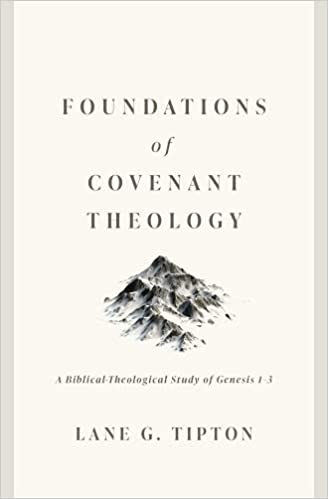
Lane G. Tipton
Reviewed by: Danny E. Olinger
Foundations of Covenant Theology: A Biblical-Theological Study of Genesis 1–3, by Lane G. Tipton. Reformed Forum, 2021. Paperback, 131 pages, $16.99. Reviewed by New Horizons editor Danny E. Olinger.
Lane Tipton’s Foundations of Covenant Theology is a 131-page biblical-theological study of Genesis 1–3. Divided into twelve chapters with questions at the end of each, the book is ideal for adult Sunday school classes. But the book is also profound in its explanation of the eschatological goal set before Adam in the covenant of works and the realization of that goal through the person and work of the second Adam, Jesus Christ, in the covenant of grace.
Tipton declares that the central concern of Scripture is the glory of the self-contained triune God who in the beginning created the heavens and the earth. Exegeting Nehemiah 9:6, Isaiah 6:1–6, and Colossians 1:16, Tipton further argues that “the heavens” of Genesis 1:1 refer to the invisible realm of glory where God dwells forever to be worshiped by his creatures—a worship wholly for his own sake.
In Eden, fellowship existed between God, the Creator, and Adam, the creature. Tipton beautifully explains that God made Adam to worship and glorify him. He writes, “God breathes life into him so that he might himself breathe out praise to God. It is a movement from God to Adam and from Adam back to God. He was created in such a way that the very breath he possessed existed so that he might confess the glory of the triune God” (71).
It was a fellowship that God initiated and upheld, but it was not the full fellowship of the highest heavens. The “special act of providence” (WSC 12) that God extended to Adam that Adam might advance from Eden to the invisible heavens and full fellowship with God was by way of covenant. Tipton explains that in Reformed theology this covenant by which God voluntarily condescended to Adam takes on different names to emphasize different aspects of the positive and verbal promise of God. “Covenant of life” (WSC 12) emphasizes the outcome of the covenant if Adam had obeyed; “covenant of works” (WCF 7.2) emphasizes the demand placed on Adam; and, “covenant of creation” distinguishes it from the covenant of grace that is established after Adam’s fall into sin.
Tipton also stresses the importance of understanding the two trees. God’s prohibition of eating of the Tree of the Knowledge of Good and Evil presented Adam with the fundamental religious question—would he love and glorify God for God’s sake alone? The tree of life pictured advancement beyond earthly probation to the highest heavens where God is enthroned in Sabbath rest.
Regarding the fall into sin, Tipton points out that Eve’s basic problem is that she treats the words of God and the words of the serpent as competing hypotheses, thus making herself the judge of competing claims. Adam and Eve then transgress God’s command, and the fellowship that once was theirs with God is lost. They hide from God, for God must judge sin. But where judgment is expected, the gospel dawns with the covenantal promise of the coming seed of the woman who will crush the head of the serpent (Gen. 3:14–15).
From this point forward, the Scripture is Christ centered. There is also no neutrality. Antithesis exists between the City of God and its representative champion, the promised seed, and the City of Man and its representative champion, the serpent.
Tipton closes the book with a detailed look at the temptation of Jesus in Luke 4. Adam fails the probation; Jesus is the second Adam who obeys. Jesus recapitulates and reverses the outcome of the temptation of Adam. Tipton also explains how Israel fails as sons of God (Exodus 16:2–3), but Jesus is the new Israel who obeys.
Highly recommended, this is a wonderful resource for understanding the scriptural foundations of covenant theology.
April 13, 2025
Suffering: God’s Purpose in Our Pain
April 06, 2025
Sunday Matters: 52 Devotionals to Prepare Your Heart for Church
March 30, 2025
On the Trail with a Missionary
March 23, 2025
Midnight Mercies: Walking with God Through Depression in Motherhood
March 16, 2025
March 09, 2025
Zwingli the Pastor: A Life in Conflict
March 02, 2025
© 2025 The Orthodox Presbyterian Church